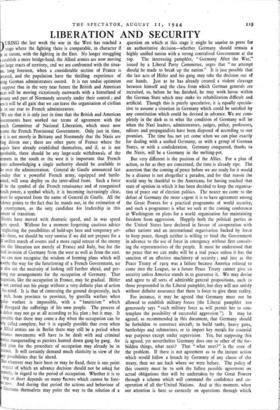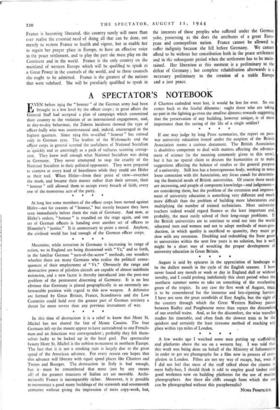LIBERATION AND SECURITY
URING the last week the war in the West has reached a stage where the fighting there is comparable, in character if t in extent, with the fighting in the East. No longer struggling establish a mere bridge-head, the Allied armies are now moving er large tracts of territory, and we are confronted with the situa- n, long foreseen, when a considerable section of France is • rated, and the population have the thrilling experience of ing German administrators ousted. It is not undue optimism suppose that in the very near future the British and American ces will be moving victoriously eastwards with a hinterland of many and part of Normandy securely under their control ; and • n it will be all gain that we can leave the organisation of civilian e in our rear to French administrators.
We see that it is only just in time that the British and American vernments have worked out terms of agreement with the each Committee of National Liberation, which must now ome the French Provisional Government. Only just in time, it is not merely in Brittany and Normandy that the Nazis are ing driven out ; there are other parts of France where the • quis have already established themselves, and if, as is not probable, there should be any large-scale withdrawals of the rmans in the south or the west it is important that French ents acknowledging a single authority should be available to e over the administration. General de Gaulle announced last onday that a powerful French army, equipped and battle- Hied, will soon deploy on the inter-allied front. Such a force 1 be the symbol of the French renaissance and of reorganised nch power, a symbol which, it is becoming increasingly clear, not be separated from the name of General de Gaulle. All the *dence points to the fact that he stands out, in the estimation of countrymen, as the only candidate for leadership in this ment of transition.
Events have moved with dramatic speed, and in war speed ts speed. Without for a moment forgetting cautious advice neglecting the possibilities of hold-ups here and temporary set- cks there, we should be very unwise if we did not prepare for a swifter march of events and a more rapid retreat of the enemy for the liberation not merely of France and Italy, but for the al invasion of Germany from the west as well as from the east. we can now recognise the wisdom of forming plans which will oothe the way for the functioning of a French Government, we also see the necessity of looking still further ahead, and per- ting our arrangements for the occupation of Germany. That upation, like the occupation in France, may be graduaL Hitler not carried out his purge without a very definite plan of action his mind. It is that of contesting the ground desperately, inch inch, from province to province, by guerilla warfare when lar warfare is impossible, with a " fanaticism " which disregard the sufferings of his own people. The process of defeat may not go at all according to his plan ; but it may. It ssible that there may come a day when the occupation can be dy called complete, but it is equally possible that even when Allied armies ape in Berlin there may still be a period when 'stance movements will have to be dealt with and criminal atics masquerading as patriots hunted down gang by gang. An ed plan for the procedure of occupation may already be in tence. It will certainly demand much elasticity in view of the Y possibilities that lie ahead.
• ut whatever may have been or may be fixed, there is one point respect of which an advance decision should not be asked for- Indy, in regard to the period of occupation. Whether it is to long or short depends on many factors which cannot be fore- now. And during that period the actions and behaviour of Germans themselves may point the way to the solution of a question on which at this stage it might be unwise to press for an authoritative decision—whether Germany should remain a highly unified nation with a strong centralised Government at the top. The interesting pamphlet, "Germany After the War," issued by a Liberal Party Committee, urges that "no attempt should be made to break up the nation." It is just possible that the last acts of Hitler and his gang may take the decision out of our hands. Just as he has already created a violent cleavage between himself and the class from which German generals are recruited, so, before he has finished, he may work havoc within the German State which may make its rehabilitation difficult and artificial. Though this is purely speculative, it is equally specula- tive to assume a situation in Germany which could be satisfied by any constitution which could be devised in advance. We are com- pletely in the dark as to what the condition of Germany will be when the Nazi leaders, administrators, judges, police, professors, editors and propagandists have been disposed of according to our promises. The time has not yet come when we can plan exactly for dealing with a unified Germany, or with a group of German States, or with a confederation. Germany conquered, thanks to the Nazis, will be a Germany in the melting-pot.
But very different is the position of the Allies. For a plan of action, so far as they are concerned, the time is already ripe. The assertion that the coming of peace before we are ready for it would be a disaster is not altogether a paradox, and for that reason the world may be thankful to the Americans for having reached that state of opinion in which it has been decided to keep the organisa- tion of peace out of election politics. The nearer we come to the defeat of Germany the more urgent it is to have agreement among the Great Powers for a practical programme of world security, and such a programme is what we seek at the coming conference at Washington on plans for a world organisation for maintaining freedom from aggression. Happily both the political parties in the United States have declared in favour of co-operation with other nations and an international organisation backed by force to keep peace, though neither is willing to bind the Government in advance to the use of force in emergency without first consult- ing the representatives of the people. It must be understood that no peace that we can make will be a real peace unless it has the sanction of an effective machinery of security ; and just as the Peace Treaty of 1919 was a failure because America refused to come into the League, so a future Peace Treaty cannot give us security unless America stands in to guarantee it. We may devise • and agree to all sorts of admirable general propositions, such as those propounded in the Liberal pamphlet, but they will not satisfy without definite assurance that there is force to give them reality.
For instance, it may be agreed that Germany must not be allowed to establish military forces (the Liberal pamphlet too generously says "such military force as will permit her to con- template the possibility of successful aggression "). It may be agreed, as recommended in this document, that Germany should be forbidden to construct aircraft, to build tanks, heavy guns, battleships and submarines, or to import key metals for essential war purposes except under supervision Yes, but supposing this is agreed, yet nevertheless Germany does one or other of the for- bidden things, what next? That "what next?" is the crux of the problem. If there is not agreement as to the instant action which would follow a breach by Germany of any clause of the treaty, then we are back where we were before. The policy of this country must be to seek the fullest possible agreement on actual obligations that will be undertaken by the Great Powers through a scheme which will command the confidence and co- operation of all the United Nations. And at this moment, when our attention is bent so earnestly on operations through which France is becoming liberated, this country surely will more than ever realise the essential need of doing all that can be done, not merely to restore France to health and vigour, but to enable her to regain her proper place in Europe, to have an effective voice in the peace settlement, and to play the part she must play on the Continent and in the world. France is the only country on the mainland of western Europe which will be qualified to speak zs a Great Power in the counsels of the world, and to those counsels she ought to be admitted. France is the greatest of the nations that were subdued. She will be peculiarly qualified to speak in the interests of those peoples who suffered under the German yoke, possessing as she does the attributes of a great Euro- pean and cosmopolitan nation. France cannot be allowed to suffer indignity because she fell before Germany We cannot afford to be without her comribution both in the peace settlement and in the subsequent period when the settlement has to be main- tained. Her liberation at this moment is a preliminary to the defeat of Germany ; her complete rehabilitation afterwards is a necessary preliminary to the creation of a stable Europe and a just peace.



























 Previous page
Previous page